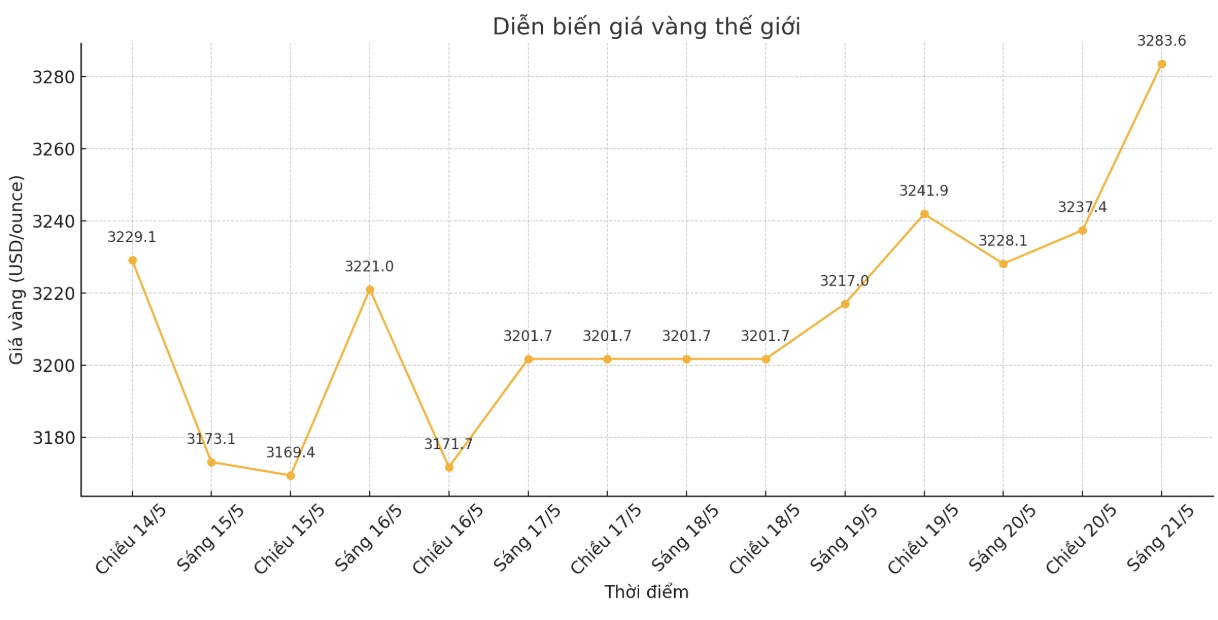On Kitco, Aaron Hussein - global market strategist at JP Morgan Asset Management said that investors should not put all their faith in gold: "Gold is a good asset for diversification and flexibility for portfolios, but high volatility, does not create income and is unstable as an anti-inflationary barrier".
Mr. Hussein said that it is not surprising that gold has attracted a lot of attention recently, as gold prices have almost doubled since 2022, attracting new investors.
There are many factors that are driving gold demand back up. Increased geopolitical risks such as tensions in the Middle East and the Russia-Ukraine conflict make gold a sought-after safe haven asset.
At the same time, concerns about US public finance and speculation about the future of the USD also contributed to stimulating demand. Central banks in emerging markets are also increasing their gold reserves, creating more momentum for the metal, he explained.

In that context, investors are reviewing the role of gold in their portfolios. But before rushing to chase upward, Mr. Hussein advised looking back at the real characteristics of gold and whether to increase the strategic proportion.
First, gold's long-term performance depends heavily on the investment timing. For more than three decades, gold has been the least efficient asset in both absolute yields and adjustment risks, losing both stocks and real estate, and only achieving a yield equivalent to bonds but with three times more volatility.
However, if calculated from the mark 25 years ago, gold is the best yielding asset, surpassing stocks, bonds and other real assets such as real estate.
Second, gold is very volatile and often goes through long periods of sideways prices. Since gold does not generate income or profit, its value depends largely on market sentiment surrounding inflation, macroeconomic pressures and confidence in the statute of limitations.
These factors are cyclical, unpredictable and often reverse, as the history of gold shows that after the peak in 1980, gold prices actually decreased for two decades and only recovered to the peak in 1980 in early 2025, equivalent to 45 years of actual bearishness.
Third, gold is not always an effective anti-inflationary barrier. Gold is often seen as a hedge against inflation and has flourished well in the 1970s, but over the past 40 years, the correlation between gold and inflation in the US has often been negative, not positive.
Even during the period of high inflation from 2020 to 2022, gold prices fell, making the precious metal the most ineffective asset in many types of key assets.
Fourth, gold does not generate income. This seems obvious, but in the current context when investors can get a yield of 4-5% from bonds or other real assets, the opportunity cost of holding gold is obvious.
Gold does not have a foundation and all profits come from price fluctuations, depending more on psychology than fundamentals.
Meanwhile, core assets such as real estate and infrastructure have brought stable profits over the past three decades, largely thanks to steady income from operations, helping to reduce overall fluctuations and provide regular revenue for investors.
Concluding, Mr. Hussein acknowledged that in the current economic and geopolitical context, gold still plays an important role. Gold can act as a lifeline in the face of geopolitical shocks, a downward trend in globalization and a weakening of confidence in the foreseeable, so a small and moderate proportion in the portfolio helps diversify and create flexibility.
However, gold is not a "medicine for all diseases". It fluctuates strongly, does not generate income, is unstable in its anti-inflation effectiveness and has experienced many periods of slow growth.
Other real estate such as infrastructure, real estate and forest land also have many similar defensive characteristics but are more stable, while generating regular income.
Therefore, gold should be seen as part of a broader diversification strategy, combined with assets with stable income and few fluctuations to consolidate portfolios in many market scenarios.
Holding a little gold makes sense in todays volatile world. But relying entirely on gold as the only diversification tool is unreliable, he concluded.











